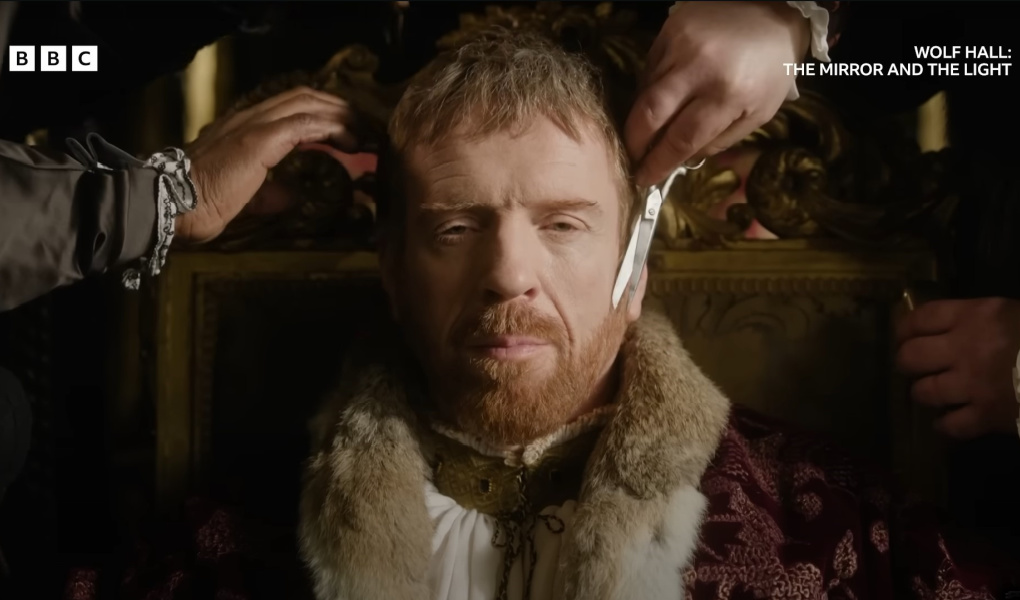– Blood Has Been Spilled –
by Rachael Sigee | iNews | November 10, 2024
Five out of Five Stars
This adaptation of Hilary Mantel’s final novel does justice to her ingenious ability to draw out nuance of Tudor politics.
It was something of a miracle when, back in 2015, Mark Rylance submerged us in the shrewd, scheming psyche of Thomas Cromwell as convincingly as Hilary Mantel had in her Booker-Prize-winning novels, Wolf Hall and Bring Up the Bodies. In both the books and the BBC adaptation, we walked perfectly in step with Cromwell, as he rose from lowly origins to orchestrate Henry VIII’s divorce from Catherine of Aragon, fix his marriage to Anne Boleyn and establish the King as the Head of the Church of England .
Nearly a decade later and at last we have a glorious adaptation of the final hefty tome in Mantel’s trilogy, The Mirror and The Light. Again adapted by Peter Straughan and directed by Peter Kosminsky – although sadly without the guiding hand of Mantel, who died in 2022 – the six-part series opens in 1536, with Claire Foy’s trembling Anne Boleyn being rowed to her death. As her head is severed, King Henry VIII (Damian Lewis, who is exceptional) marries Jane Seymour (Kate Phillips) and the dust settles across Europe in the wake of England’s break with the Catholic church. Blood has been spilled and there is surely more to come.
One man remains unruffled: Thomas Cromwell, now Henry’s most trusted advisor, the architect of the Reformation and Lord Privy Seal. But while Cromwell appears in total control, there are hints of the downfall that is now just around the corner.
He is resolute in keeping a dangerous promise to the late Catherine of Aragon to protect her daughter Lady Mary (Lilit Lesser). He is haunted by his former mentor Cardinal Wolsey (Jonathan Pryce), whose ghostly presence serves as a reminder of the King’s changing favour. Most worryingly, his emotions are beginning to quiver into public view in the form of light boasting and brute force. Suddenly, he seems fallible.
This first episode creeps along, re-introducing us to a court of familiar names and some new faces (Timothy Spall replaces Bernard Hill, who died last year, as the Duke of Norfolk). But the intricate latticework of Tudor politics is as beautifully constructed as the original series: as candles flicker, so do loyalties.
While the King’s honeymoon period is interrupted by mutterings of a plot to place Mary on the throne, Cromwell reckons with the danger of being needed by a man like Henry, whose creeping insecurities and failing body feed his volatility to proportions as terrifying as his enormous robes.
When Cromwell is accused of being a snake by Harriet Walter’s snarling Lady Margaret Pole, he corrects her: “Oh, no… a dog, Ma’am.” But the masterfully understated Rylance – as frugal with his words as his eye contact – captures the sense that Cromwell is trapped in a web of his own making. In raising and then ruining Anne Boleyn, and bludgeoning the Catholic church in the process, he has exposed the precarity of the establishment when faced with the cleverest of minds. Now he must wrestle with the question of whether the world he has helped to build is one he actually wants to live in.
Grandiose and theatrical (of course, Mantel’s novels have also been adapted for stage), The Mirror and the Light merits such indulgence. It is ravishing to look at but without the gloss that often distances period dramas from contemporary audiences. As with Mantel’s writing, the adaptation heaves with real life – creaking floorboards and rustling papers and words that cannot be taken back once uttered.
There may have been almost 10 years in between series but this is a seamless follow-on. Above all, it does justice to Mantel’s ingenious ability to draw out nuance in this often overblown period: here it is the richest of tapestries, meticulously woven and shot through with devastating humanity.
Read the rest of the original article at iNews
